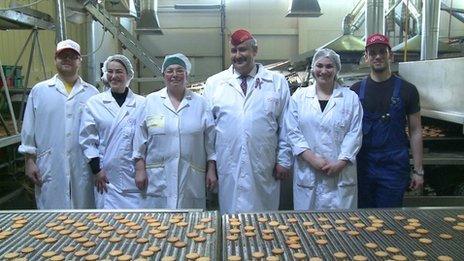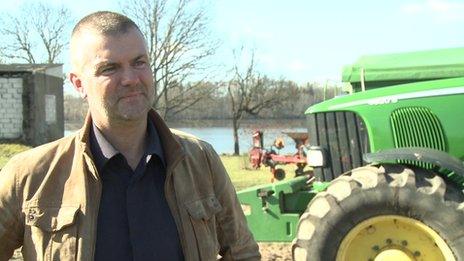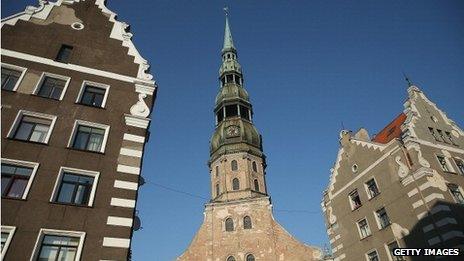Latvia: From the Soviet Union to the European Union
- Published

Latvian firm Baltas Naktis is a family-run biscuit business
A warm, rich buttery smell wafts from a factory sitting on the edge of a housing estate on the outskirts of Riga.
Inside, workers in their yellow and green uniforms knead freshly mixed dough, operate production lines and wrap biscuits in boxes for sale.
Baltas Naktis was established in 1995 by Elena and Andrey Magomedov. The couple had left the Soviet Union in 1990 in search of a better life once the Iron Curtain had fallen.
Starting from humble roots, the confectionery business used to have just four employees. However, it has now expanded to employ more than 80 people, baking about 10,000 biscuits and crispbreads every day.
"Latvia is a very young country and the tradition of business is only just developing," says their daughter Ksenija Magomedova, the company's sales manager.
"Our business is one of a kind because there aren't very many family businesses in Latvia," she adds.
"Lots of people have left the country and businesses have been sold because the economy over the past 20 years has been so volatile."
'More opportunities'
But the entrepreneurial Magomedov family believes Latvia's fortunes have been on the up since it joined the the European Union 10 years ago.
"We have more export opportunities, we have become more competitive, we make more products than ever before," enthuses Ksenija.
Turnover is up 80% from 10 years ago, but it is not just the financial aspects of being in a western economic bloc that Baltas Naktis values.
"Basically we feel safer working with EU partners. We know the companies, we can always track them and trace them. We feel safer sending our goods there and receiving the payments," says Ksenija.

Farmer Janis Dzenis with one of his tractors bought with EU funds
While the business community backed joining the EU, as many as a third of the population voted against in the national referendum in 2003.
One of them was farmer Janis Dzenis.
One hundred kilometres south-east of the capital Riga, in rural Latvia, he shows me around the land he inherited after the fall of communism.
The farm was repatriated to him after he used documentation to prove that his family owned the land prior to the Soviet Union seizing it as part of the common ownership policy.
Scarred by the experience of his country being part of the Soviet Union, Janis is sceptical about Latvia's membership of another union, the EU.
"I believe that complete freedom and independence are more important than joining the European Union," he says.
"[If you are independent] then you are the one that decides everything that happens in the country - economics, politics, production and agriculture."
The BBC's Joe Lynam has a look at how the EU membership has been for one of its smallest members
A decade on and Janis remains opposed to Latvian membership, despite the £300,000 he has received in EU grants over the years to help buy new tractors, machinery and three giant storage silos.
"Being part of the European Union, we have to accept the EU agriculture policy.
"I have thoroughly analysed these rules and I have realised that they are not like the ones that we had during our first independence in 1918. Then we had carefully developed Latvian agriculture policy and there was some tangible result.
"Currently we are losing because of the agriculture policy of the European Union and we are losing quite dramatically."
'Cliffhanger nation'
Since joining the European Union there have been some financial benefits.
For example, Latvia has received about £3.5bn in grants and the economy had almost trebled in size until the global financial crisis struck.
As a result gross domestic product collapsed, a deep recession ensued and emigration became increasingly popular for tens of thousands of Latvians who took advantage of one of the EU's founding objectives - the freedom of movement between member states.

St Peter's Church in Riga is a popular tourist destination
So for a population hovering around the 2 million mark - down from almost 2.7 million a quarter of a century ago - has EU membership changed the Latvians?
A prominent Latvian journalist, who once described Latvia as "the cliffhanger nation" because it has appeared and disappeared from the map so many times, seems like the perfect person to ask.
"I think you have to look at generations," says Pauls Raudseps.
"The older generation which grew up in the Soviet Union still feels a little distant from [the EU] because they have no direct personal experience with that, their childhood memories are in the Soviet times,
"But if you look at my children, Europe is home for them - they study there, their friends live there, they go there often and they feel much closer to that than they do to anything even say a few hundred miles to the east of here."